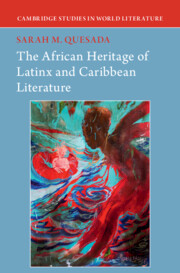‘By rehabilitating and privileging the African archive in her account of Latinx/Caribbean relations, Sarah Quesada’s book provides a fresh and very welcome instalment to debates about Pan-Africanism. But here, Pan-Africanism is more than just an aspirational political project, long distracted by the cynical pragmatism of political leaders. Rather, it is a work of re-animation that will redefine African and African diasporic relations through a well-grounded and nuanced humanities perspective. This book is a magnificent gift offering.’
Ato Quayson - Stanford University
‘Beautifully written, well researched and bold in its formulations, The African Heritage of Latinx and Caribbean Literature is an important intervention in the reading of Latinx and Latin American literature, widely defined. The brilliance of the book is manifest in the analysis, in which the Sarah Quesada unearths discreet connections to Africa and unfolds them into an ambitious and successful re-cartography of the Atlantic through a Latin America-Africa axis that is very persuasive and unique.’
Ignacio Sanchez Prado - Washington University in St. Louis
‘Sarah Quesada has written a BIG book, both in its scholarly import and geographic scope. Quesada finally centers Africa in study of the Black Atlantic. She also redresses its exclusion of Latin America - a region that received three-quarters of enslaved Africans during the colonial period - while making plain why Latinx literature has always been a world literature. Reading comparatively and with laser focus across four languages, dozens of colonial archives, and three continents, Quesada traces the textual memory and political internationalism that has thrived for over eighty years among authors and political actors from the US Southwest, the Dominican Republic, Haiti, Cuba, Colombia, and Benin, Nigeria, Senegal, and the Democratic Republic of Congo. Quesada presents the reader with the beating nexus of cultural, political, and aesthetic Latin-Africa, in vivid and engaging prose, such as only a generational thinker can accomplish. Afrolatinidad is redefined in her capable hands.’
María Josefina Saldaña-Portillo - New York University
‘Quesada’s The African Heritage of Latinx and Caribbean Literature transforms Paul Gilroy’s notion of The Black Atlantic into an Afro-Latino Atlantic…Quesada is able to make a hopeful argument for the possibility of fiction - whether traditional print novels or heritage site oral storytelling - to helpfully respond to and potentially transform the path wrought by this real and symbolic violence.’
Tom McEnaney - University of California, Berkeley
‘Quesada’s book offers a useful model on how to move from Eurocentric interpretations that have obscured the Black presence in Latinx and Caribbean fiction toward an innovative African-centered approach that promises to invigorate the field.'
Jose O. Fernandez
Source: American Literary History
‘As a text anchored in World Literature, it also provides a useful introduction to the major frameworks of this field for scholars grounded in Caribbean, Latin American, and Latinx literature, all of whom are potential readers of this study.’
Rebeca L. Hey-Colón
Source: Chasqui
‘… The book’s major strength is the stress on African particularity, even as it chronicles the failures of authors discussed in the book to fully grasp this particularity … but its skillful reading deployed in the book opens the space for rehabilitation, even at the scene of distortion. Restoring its African inheritance to Latinx literature, Quesada instructs us to take the continent seriously.’
Cajetan Iheka
Source: Syndicate Literature
‘Through impressive fieldwork and archival research, Quesada excavates the imprint of African epistemologies, histories, spiritual practices, and proverbs on Latinx writing. … In blazing trails overgrown with racism and neglect, Quesada’s precise prose engenders new connections among them. … Ultimately, [the work] makes an airtight case for the significance of Latin-African conjunctions.’
Michael Dowdy
Source: Latino Studies



